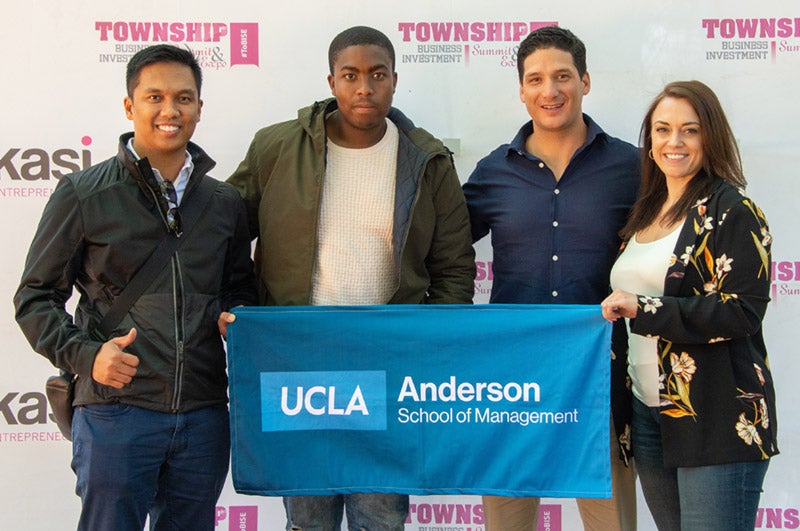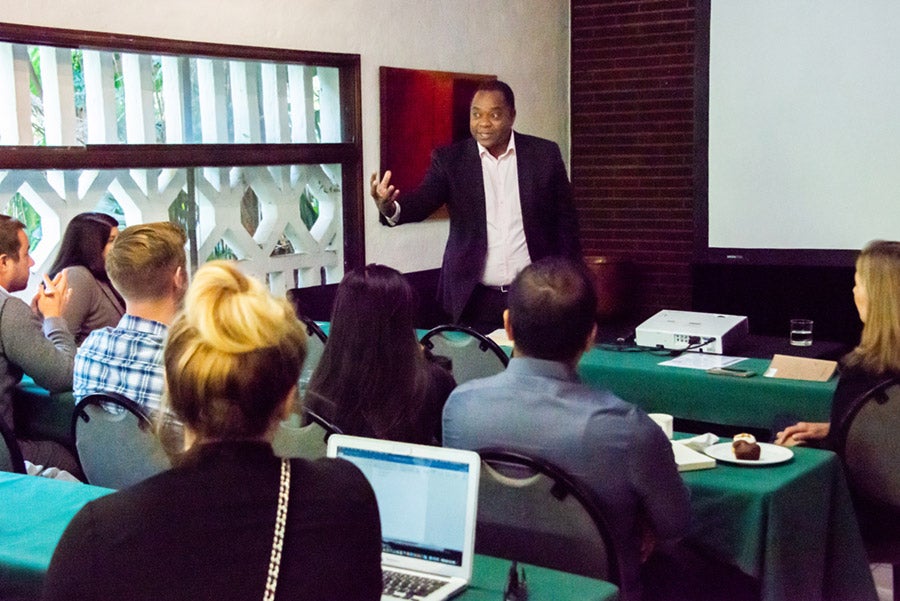Local Communities in South Africa Profit from Creative Business Structures
Local Communities in South Africa Profit from Creative Business Structures

Belinda Lau (EMBA ’20) and Jerome Santos (EMBA ’20) are executives in the U.S. health care field, and both founded enterprises they hope will influence their industry to be more pro-social and environmentally sustainable. Lau, former senior manager of business transformation at Medtronic, is incubating her oral hygiene startup Wise Earthcare in the UCLA Anderson Venture Accelerator. A health care consultant, Santos holds an appointment as assistant clinical professor at the University of Washington and founded the Everhope International Foundation. As participants in Lecturer Gayle Northrop’s (’96) Social Entrepreneurship and Innovation course, they traveled to South Africa in a group of 26 executive MBA students for a week of immersion in the thriving culture of African social enterprises to learn how “prosocial” businesses succeed in an age of waning corporate philanthropy.

South African entrepreneur Phumzili Mthembu (second from right) discussed her business, Inqcweti PTY, in a mentorship circle with UCLA Anderson Class of 2020 EMBA students Belinda Lau, Sharon Litaker and Matt Cole at eKasi, a youth founded and led township entrepreneurial organization | UCLA Anderson Class of 2020 EMBA students Brendon Gehrke, Jerome Santos and Cheryl Hundley discussed business strategy with entrepreneur Avelino Maleke of MLK Tech (far left)
Jerome Santos: As a clinician, health care leader, educator and founder of a nonprofit organization, I was exploring how I could impact a health care system in crisis while making it sustainable. After taking this course, I found the answer. Using a hybrid model, I can combine the concepts of for-profit and nonprofit work into one initiative. Now, my path is much clearer as far as how I can influence health care without draining my own resources and energy.
Belinda Lau: Doing business for good was the key takeaway for me. After being at a Fortune 200 company for over 15 years, I had not seen business models like I saw in South Africa. That is, how you can make a profit and take care of social issues — people and planet — through creatively setting up your business structure. And it does not have to be a nonprofit. We visited a social enterprise called R Labs that did this very well. They upskill kids in coding and IT in the townships and then get companies to use these kids’ services to make apps and other tech solutions. The profit center is under the nonprofit, and all profits made run the nonprofit. Usually it is the other way around in the U.S. Because of this, they never needed to fundraise and were completely sustainable, while lifting kids out of poverty and unemployment.

Entrepreneur Avelino Maleke of MLK Tech (second from left) with UCLA Anderson Class of 2020 EMBA students Jerome Santos, Brendon Gehrke and Cheryl Hundley
Lau: Yes, André Ross. He is the executive director of global corporate banking at JPMorgan, but he grew up in the townships and was able to bring himself and his whole family out of poverty. He spoke openly with us about race, inequality and despair but also hope for the future. He was kind and funny and incredibly smart, and showed us that you must have open conversations about these tough issues in order to heal and move forward, and also to understand one another.
Santos: We also met Suzanne Ackerman-Berman, an executive administrator of family-owned affordable food retail chain Pick n Pay. A guiding principle of their business is “Doing good is good business.” I was inspired by her talk and the work of the company to create a thriving community. To me, what they are doing is the true essence of entrepreneurship. I personally believe that all corporations should assume social responsibility, and Pick n Pay is a perfect example.
Lau: This trip to South Africa changed all of our lives for the better. We were all on this week-long journey of increasing hope, on day one visiting a township and at the end visiting a winery that works for social good. We all grew as individuals and as team members.
Santos: We had the chance to mentor other social entrepreneurs in South Africa and teen job seekers. We all felt we made a difference after engaging with local people, who allowed us to share our expertise in our respective fields. It was a unique cross-cultural experience in learning from both parties.

André Ross, executive director of global corporate banking at JPMorgan, spoke to UCLA Anderson EMBA students in Johannesburg on South Africa's socioeconomic transformation
Lau: The most incredible eye-opener on the whole trip was the youth of South Africa. Their unemployment rate is over 50% and they face unimaginable challenges, such as constant threat of rape, violence, poverty and swelling xenophobic attacks. Yet their attitudes were bright, hopeful and optimistic. I wish I could have bottled up their energy and hope and brought it back to the U.S. to the youth here, where incidences of depression and anxiety are at an all-time high for college students and young adults.
Santos: Many years of working in health care and heading outreach programs had drained my energy. But this trip has revitalized my energy to serve more underprivileged communities around the globe. My overall experience inspired me to keep on doing what I have started and taught me business strategies that will shape my vision and mission to be more successful. It added an enormous amount of value to my goal as a health care executive to change the world. I feel ready to move forward.
Lau: One of the most rewarding things I have done in my life is help the local entrepreneurs we met, who needed some advice on their businesses. It was so simple: just listening and giving feedback. The entrepreneurs were so grateful, and we truly felt like we made a difference, even in just one person’s life. In all my working years (over 15!), I have not felt so rewarded or connected to the human spirit.